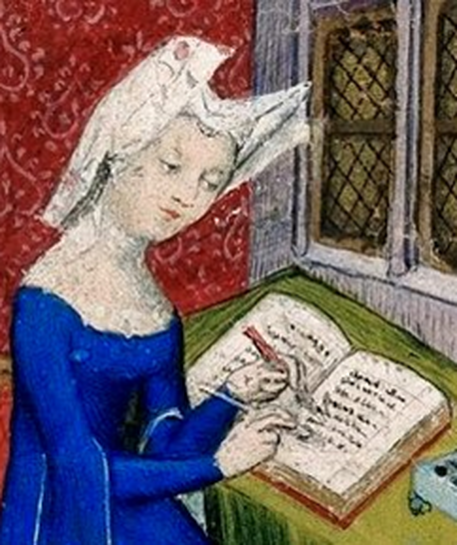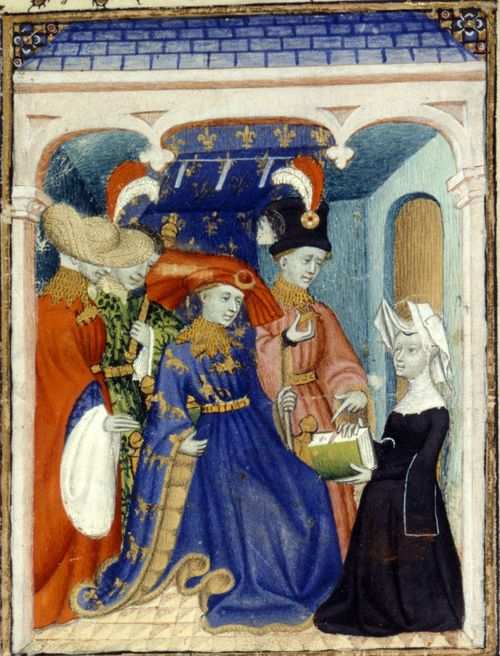 Compendium of Christine de Pizan’s Works,
writing in her library, 1413 CE
© British Library, Harley 4431, folio 4
Compendium of Christine de Pizan’s Works,
writing in her library, 1413 CE
© British Library, Harley 4431, folio 4
Christine de Pizan, 1364-1430, daughter of Tommaso di Benvenuto da Pizzano, wife to Etienne du Castel, a notary and royal secretary to king Charles V of France.
Christine moved from her birthplace of Venice to Paris after her father was recruited by Charles V to be his court astrologer. She was brought up in the court becoming one of the best-educated women of her time. Widowed at twenty-five with three children and responsible for her recently widowed mother Christine began to compose and circulate poetry both as an expression of her grief of at the loss of her husband as well as a means of acquiring royal or ducal patronage.
During a thirty year career from 1399-1429 she produced a wide range of text in prose as well as verse for a number of patrons in a variety of genres. During this time she was also involved in the production of manuscripts of her works, her skillful use of the institutions of patronage and book production have led modern scholars designating her the first professional woman of letters in European history.
Christine moved from her birthplace of Venice to Paris after her father was recruited by Charles V to be his court astrologer. She was brought up in the court becoming one of the best-educated women of her time. Widowed at twenty-five with three children and responsible for her recently widowed mother Christine began to compose and circulate poetry both as an expression of her grief of at the loss of her husband as well as a means of acquiring royal or ducal patronage.
During a thirty year career from 1399-1429 she produced a wide range of text in prose as well as verse for a number of patrons in a variety of genres. During this time she was also involved in the production of manuscripts of her works, her skillful use of the institutions of patronage and book production have led modern scholars designating her the first professional woman of letters in European history.
|
When civil conflict erupted in 1418, Christine had to withdraw to an abbey outside the city for safety which essentially ceased her literary activity. She strongly opposed stereotyping and misogyny in the male-dominated realm of the arts and through her writings encouraged women to be chaste she provided them with moral instruction and social skills that would enable them to survive as honorable women within communities still pervaded by antifeminist prejudices. She wrote at least twelve books and ten works in verse including “The Books of the City of Ladies” published about 1415, which combines legend with reality in a sweeping allegory of a city of ladies and is probably the first history of women in the European world. Christine also wrote “The Book of Three Virtues” which was one of the first books to offer specific counsel to women of each social class. Both of these books have been frequently quoted because in them she expressed, as a woman, what she felt should be the rightful place of women within her society, no other medieval woman speaks so strongly for her sex at every level of society.
|
As one of the most prolific writers of the 15th century and accepting the medieval framework that woman was naturally subject to man she also had a practical realization of the complimentary natures of the two, recognizing the valuable part women actually played in society and the respect and sympathy they deserved.
Christine admired Joan of Arc’s passion and ability, writing it was a young women who had recovered and made safe the kingdom of France, ‘something that 5,000 men could not have done’. Another famous quote is that of a man who once said to her that educated women were unattractive because there were so few of them to which she retorted ignorant men were even less attractive because there were so many of them. She was held in great esteem by her contemporaries and was one of the few true feminists before the modern era.
Christine admired Joan of Arc’s passion and ability, writing it was a young women who had recovered and made safe the kingdom of France, ‘something that 5,000 men could not have done’. Another famous quote is that of a man who once said to her that educated women were unattractive because there were so few of them to which she retorted ignorant men were even less attractive because there were so many of them. She was held in great esteem by her contemporaries and was one of the few true feminists before the modern era.
References and Further Reading
- Jackson, Deirdre, Medieval Women, British Library,2015.
- Labarge, Margaret Wade. A Small Sound of the Trumpet, Women in Medieval Life. Beacon Press, 1986.
- Schaus, Margaret, editor. Women and Gender in Medieval Europe, An Encyclopedia. Routledge Taylor & Francis Group, 2015.
- Woolgar, C.M. The Great Household in Late Medieval England. Yale University Press. 1999.
